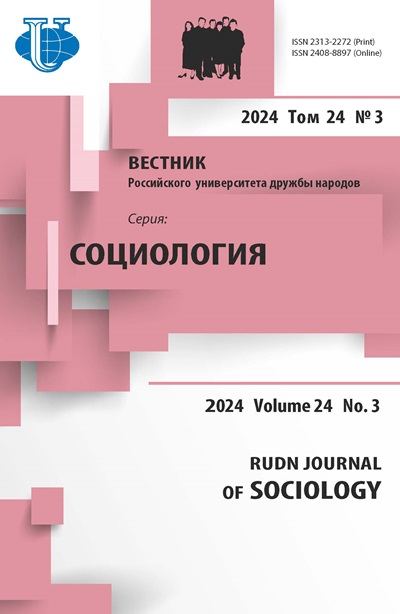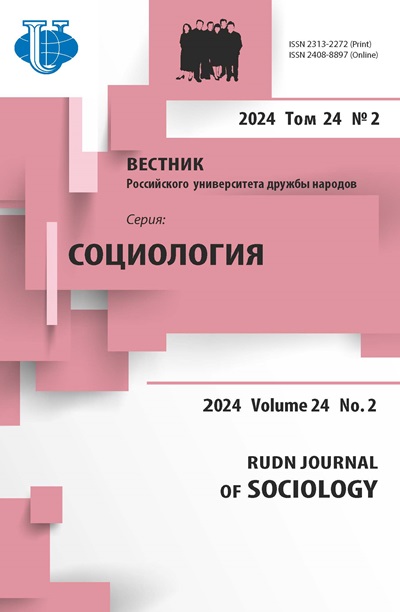Levels and components of the social identity of the contemporary Russian society
- Authors: Rakova K.V.1
-
Affiliations:
- Institute of Philosophy of RAS
- Issue: Vol 24, No 2 (2024)
- Pages: 510-522
- Section: Sociological lectures
- URL: https://journals.rudn.ru/sociology/article/view/39940
- DOI: https://doi.org/10.22363/2313-2272-2024-24-2-510-522
- EDN: https://elibrary.ru/RWUOQG
Cite item
Full Text
Abstract
The relevance of the research is determined by the need to find ways for the consolidation and unification of the polycentric, multinational and multicultural Russian society under contemporary challenges. The author uses a complex theoretical-methodological approach combining the theory of social identity (H. Tajfel and J.C. Turner), the concepts of “self” (G. Mead) and “personality crisis” (E. Erikson), the phenomenological paradigm (A. Schutz) and the theory of cultural trauma (J. Alexander). The article presents a fourlevel structure of social identity, which includes individual, group, state and global (world) levels, and different types of social identity at each. Thus, the features of subjective and objective identities are shown at the individual level; regional, cultural, national, linguistic, professional and social-class identities - at the group level; state-civil, historical, territorial and political - at the state level; post-Soviet, Asian, European and cosmopolitan - at the global level. The author provides some empirical tools for identifying the affiliative component of social identity at the individual, group, state and global (world) levels and insists on the need to search for answers to research questions about the Russian identity in general, socialcultural differences between residents of Russia and other countries, territorial features of Russia as a state and its continent, the influence of the West and East on the Russian culture, and the impact of global openness and “liquid modernity” (Z. Bauman) on the Russian social identity. The article considers “triggers” for the transformation of social identity, which initially appear either at the individual or global level, depending on the context and social source. The author argues that the study of the social-cultural core of the heterogeneous Russian identity under the extremely dynamic and nonlinear social processes affecting the key areas of Russian life can contribute to the development of a strategy for improving social well-being in the Russian society and to the search for effective ways of its consolidation given its polycentricity and multiculturalism.
About the authors
K. V. Rakova
Institute of Philosophy of RAS
Author for correspondence.
Email: rakova@iphras.ru
Goncharnaya St., 12/1, Moscow, 109240, Russia
References
- Beck U. Obshhestvo riska: Na puti k drugomu modernu [Risk Society: Towards a New Modernity]. Moscow; 2000. (In Russ.).
- Weber M. Khozjajstvo i obshchestvo: ocherki ponimajushchej sotsiologii [Economy and Society: Essays on Interpretive Sociology].Vol. I: Sociology. Moscow; 2016. (In Russ.).
- Gorshkov M.K., Tyurina I.O. Konsolidatsija rossijskogo obshchestva v uslovijah sovremennyh vyzovov: istoriko-sotsiologichesky i tsennostno-mirovozzrenchesky konteksty [Consolidation of the Russian society under contemporary challenges: Historical, sociological and valueworldview contexts]. RUDN Journal of Sociology. 2023: 23 (4). (In Russ.).
- Jeri D., Jeri J. Bolshoj tolkovy sotsiologichesky slovar [Large Explanatory Sociological Dictionary]. Moscow; 1999. (In Russ.).
- Drobizheva L.M., Arutyunova E.M., Evseeva M.A. et al. Rossijskaja identichnost i mezhjetnicheskie otnoshenija. Publichny diskurs i sotsialnaja praktika [Russian Identity and Interethnic Relations. Public Discourse and Social Practice]. I.M. Kuznetsov, S.V. Ryzhova (Eds.). Moscow; 2022. (In Russ.).
- Drobizheva L.M., Ryzhova S.V. Grazhdanskaja i etnicheskaja identichnost i obraz zhelaemogo gosudarstva v Rossii [Civil and ethnic identity and the image of the desired state in Russia]. Political Studies. 2015; 5. (In Russ.).
- Istoricheskaja pamjat i rossijskaja identichnost [Historical Memory and Russian Identity]. V.A. Tishkov, E.A. Pivneva (Eds.). Moscow; 2018. (In Russ.).
- Istoricheskoe soznanie rossijan: otsenki proshlogo, pamjat, simvoly (opyt sotsiologicheskogo izmerenija) [Historical Consciousness of Russians: Assessments of the Past, Memory, Symbols (Sociological Measurement)]. M.K. Gorshkov (Ed.). Moscow; 2022. (In Russ.)
- Lapin N.I. Status regionov Rossii i razbalansirovannost ih sotsiokulturnyh funktsij [The status of Russian regions and the imbalance of their social-cultural functions]. Universe of Russia. 2010; 15 (2). (In Russ.).
- Magun V.S., Rudnev M.G. Zhiznennye tsennosti rossijskogo naselenija: skhodstva i otlichija v sravnenii s drugimi evropejskimi stranami [Vital values of Russians: Similarities and differences compared to other European countries]. Vestnik Obshhestvennogo Mnenija. Dannye. Analiz. Diskussii. 2008; 1. (In Russ.).
- Mead G.H. Izbrannoe [Selected Works]. Moscow; 2009. (In Russ.).
- Motroshilova N.V. Globalizatsija i kriticheskoe obnovlenie universalnyh tsennostej razuma, prosveshchenija i obshhestvennogo dogovora [Globalization and critical renewal of the universal values of reason, enlightenment and social contract]. Moral i Universalnost. Issue 1. Moscow; 2018. (In Russ.).
- Mukomel V.I., Grigorieva K.S., Monusova G.A. et al. Adaptatsija i integratsija migrantov v Rossii: vyzovy, realii, indikatory [Adaptation and Integration of Migrants in Russia: Challenges, Realities, Indicators]. V.I. Mukomel, K.S. Grigorieva (Eds.). Moscow; 2022. (In Russ.).
- Omelchenko D.A., Omelchenko E.L. V poiskah doma. Regionalnaja identichnost molodyh kaliningradtsev: zhiznennye strategii i migratsionnye namerenija [In search of home. Regional identity of the Kaliningrad youth: Life strategies and migration intentions]. Monitoring of Public Opinion: Economic and Social Changes. 2022; 6. (In Russ.).
- Raitina M.Yu., Zinovieva V.I., Pokrovskaja E.M. Kharakteristika tipov etnicheskoj identichnosti v studencheskom soobshchestve (po materialam oprosa v Tomskom universitete sistem upravlenija i radiojelektroniki) [Characteristics of the types of ethnic identity in the student community (based on the survey at the Tomsk University of Control Systems and Radio Electronics)]. Rusin. 2023; 73. (In Russ.).
- Sanina A.G., Pavlov A.V. Gosudarstvennaja identichnost: soderzhanie ponjatija i postanovka problemy [State identity: Content of the concept and the research problem]. Upravlencheskoe Konsultirovanie. 2015; 9. (In Russ.).
- Shergalieva M.T. Etnicheskaja identichnost kak vid sotsialnoj identichnosti [Ethnic identity as a type of social identity]. Vestnik Saratovskogo Gosudarstvennogo Tekhnicheskogo Universiteta. 2014; 1. (In Russ.).
- Schutz A. Izbrannoe: Mir, svetjashchijsja smyslom [Selected Works: A World Glowing with Meaning]. Moscow; 2004. (In Russ.).
- Erikson E. Identichnost: junost i krizis [Identity: Youth and Crisis]. Moscow; 1996. (In Russ.).
- Alexander J.C. (Ed.). Cultural Trauma and Collective Identity. California; 2004.
- Tajfel H., Turner J.C. The social identity theory of intergroup behavior. Jost J.T., Sidanius J. (Eds.). Political Psychology. New York; 2004.
- Urry J. Global Complexity. Cambridge; 2003.
- Wearing M. (Ed.). Social Identity. New York; 2011.
- Wendt A. Social Theory of International Politics. Cambridge; 1999.














